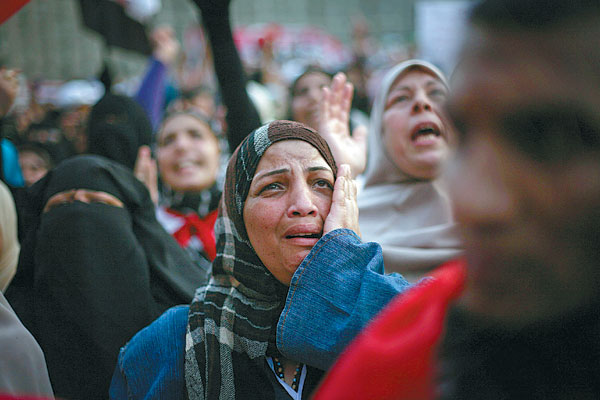Islamist wins Egyptian vote
By Zhao Shengnan (China Daily) Updated: 2012-06-25 07:15Muslim Brotherhood candidate Mohammed Morsi defeated ex-prime minister Ahmed Shafiq on Sunday to become Egypt's first post-uprising president.
Morsi won 51.73 percent of the vote after a race that polarized the Arab world's most populous country, according to the country's presidential election commission.
 |
|
An Egyptian woman cries in Tahrir Square as the country awaits the outcome of a presidential runoff vote in Cairo, Egypt, on Saturday. Tens of thousands of supporters of the Muslim Brotherhood rallied in Tahrir Square in a show of support for candidate Mohammed Morsi, who won 51.73 percent of the vote, according to the country's presidential election commission.[Photo/Agencies] |
The result of the June 16 to 17 runoff will end the nerve-wracking presidential election,but promises no resolution to the power struggles among Islamists, the military and other factions, analysts said.
Morsi and Shafiq both declared on June 18 that they had won what was by all accounts a very close race.
Morsi, as the representative of the opposition party that Mubarak and his supporters spent a lifetime fighting, has sought to allay the fears of secular groups by promising a diverse and inclusive political system in Egypt.
Shafiq pledged to restore security and stability, but as a retired general and the ousted leader Hosni Mubarak's last prime minister, he is reviled by the activists who led the 2011 uprising.
The election results may be a sign that Egyptians feared returning to the old regime under Shafiq's leadership, despite his assurances of also wanting an inclusive government, said Ruan Zongze, deputy director of the China Institute of International Studies.
An Islamist president of Egypt will be historic for the Middle East and will greatly encourage Islamic forces in the region, he added.
But Morsi's victory may bring a new wave of clashes between the Brotherhood and the military, experts said.
The elections commission postponed announcing election results that had been scheduled to come out on Thursday, leading to speculation that the military was using those results to bargain with the Brotherhood about a post-election division of powers.
The military, which took over after Mubarak's ouster, has promised to hand over power to civilian rule by July 1. But it made a series of last minute moves that stripped the office of president of most of its chief powers and kept those powers concentrated in its hands.
On June 15, Egypt's highest court dissolved the country's Islamist-led parliament, calling the law under which it had been elected unconstitutional. Two days later, the generals issued a declaration in which they gave themselves legislative powers, including control over drafting a constitution.
Those changes mean that even if Morsi wins the election, the Brotherhood is left with no parliament, no say in the constitution and a powerless president.
The military has made it clear that the military council will continue ruling the country for another 18 months after the election, to monitor the new government "like a regent", He Wenping, an African studies expert with the Chinese Academy of Social Sciences, told Chinese media.
The new government may prioritize fighting with the military for more power to implement its policies, despite Egyptians' longing for social stability and development, said An Huihou, former Chinese ambassador to Egypt, Tunisia, Lebanon and Algeria.
"Since the military certainly would not cede power, new conflicts between the two sides are looming," An said.
AP, AFP and Reuters contributed to this story.
zhaoshengnan@chinadaily.com.cn






